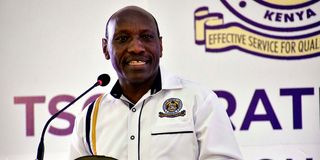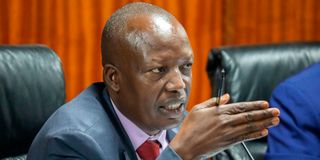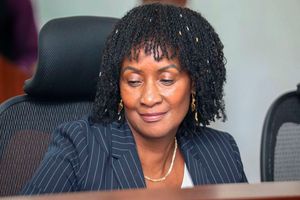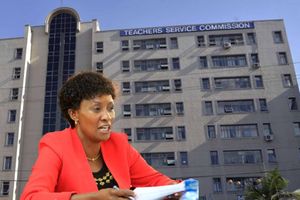
Teachers Service Commission CEO Dr Nancy Macharia and lawyer Calvin Anyuor before the National Assembly Committee on Education at Parliament Buildings Nairobi on April 24, 2025.
Senior officials from the Teachers Service Commission (TSC) were on Tuesday taken to task by the National Assembly Committee on Education over the controversial promotion of 25,252 teachers, amid accusations of irregularities, ethnic imbalance, and non-compliance with promotion criteria.
During a tense session, MPs questioned the rationale behind promoting 5,291 teachers who had served in their current job grades for less than six months — significantly short of the three-year minimum requirement set for eligibility. Legislators rejected the TSC’s justification that the rule had been relaxed to promote fairness for teachers from marginalised communities and those in acting positions.

The National Assembly Education Committee chaired by Tinderet MP Julius Melly at Bunge Tower in Nairobi on May 13, 2025.
“We are giving you one last chance before this committee cites the commission for contempt - you have completely dishonoured this committee,” said committee chairperson Julius Melly.
The committee had requested the TSC to provide concrete evidence of teacher shortages in eligible job groups to support its decision to alter the rules. However, commissioners led by TSC Chair Jamleck Muturi failed to convince lawmakers, submitting their written responses just minutes before the meeting - despite being asked to do so three days earlier.

Teachers Service Commission Commission Chairman Dr Jamleck Muturi.
“After analysis, some job groups did not attract applicants in certain counties, hence the decision to lower the three-year experience threshold,” said Dr Muturi.
He was accompanied by outgoing CEO Nancy Macharia and Director of Legal, Labour and Industrial Relations Cavin Ayuor. However, their explanations were dismissed as vague and evasive. Lawmakers further criticised the commission for failing to provide a county-by-county breakdown of the promoted teachers.
Data presented by the TSC revealed that five ethnic groups - Kikuyu, Kalenjin, Luhya, Luo and Kamba - secured over two-thirds of all promotions. This raised fresh questions about equity and compliance with public service diversity standards.
The TSC data shows teachers from Kalenjin ethnicity were second at 15.8 per cent (4,003), the Luhya community at 12.4 per cent (or 3,148), followed by Luos at 9.4 per cent (2,388) and Kambas at nine per cent (2,280).

Chairperson of the National Assembly Committee on Education Julius Kibiwot Melly.
This is despite the Public Service Commission’s (PSC) 2015 diversity policy, which classifies an ethnic group as over-represented if its share of public service jobs exceeds its proportion in the national population. The Kikuyu, for instance, make up 17.1 per cent of the national population but claimed the largest share of promotions.
In stark contrast, minority communities such as the Njemps, Murulle, Elmolo, Hawiyah, and Gosha had between one and four teachers promoted.
The issue of ethnic disparity in TSC appointments is not new. The Senate Committee on National Cohesion, Equal Opportunity and Regional Integration previously raised similar concerns over the skewed hiring of junior secondary school teachers, but the TSC attributed this to the availability of qualified applicants per subject and region.
The Education Committee also faulted the TSC for promoting teachers who had already benefited from promotions the previous year- in breach of its own policy that bars consecutive-year promotions. According to the submitted data, several teachers were elevated to new grades despite having spent only a year in their current roles.
This has prompted speculation that some promotions may be revoked.
“The TSC has used opaque criteria and failed to uphold principles of equity,” the committee noted in an earlier sitting on April 14, 2025.








